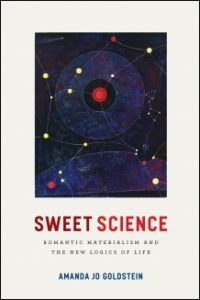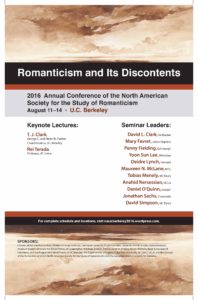Join Amanda Jo Goldstein for a discussion of her Sweet Science: Romantic Materialism and the New Logics of Life
Wednesday, Apr 11, 2018 | 12:00 pm to 1:00 pm in the Geballe Room, 220 Stephens Hall, UC Berkeley
 Today we do not expect poems to carry scientifically valid information — but this was not always the case. In Sweet Science: Romantic Materialism and the New Logics of Life (Chicago, 2017), Amanda Jo Goldstein explores how Romantic poetry served as an important tool for scientific inquiry. She argues that the work of authors such as William Blake and Percy Shelley makes a compelling case for poetry’s role in the perception and communication of empirical realities.
Today we do not expect poems to carry scientifically valid information — but this was not always the case. In Sweet Science: Romantic Materialism and the New Logics of Life (Chicago, 2017), Amanda Jo Goldstein explores how Romantic poetry served as an important tool for scientific inquiry. She argues that the work of authors such as William Blake and Percy Shelley makes a compelling case for poetry’s role in the perception and communication of empirical realities.
Amanda Jo Goldstein is Assistant Professor of English at UC Berkeley specializing in Enlightenment and Romantic literature and science, with particular interests in rhetoric and poetics, pre-Darwinian biology, and materialist theories of history, poetry, and nature. A version of her Sweet Science chapter “Growing Old Together: Lucretian Materialism in Shelley’s The Triumph of Life” was first published in Representations in 2014.
Presented by the Townsend Center for the Humanities

 On Friday, August 12,
On Friday, August 12, 